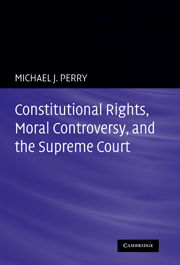Book contents
- Frontmatter
- Contents
- Acknowledgments
- Introduction: A (partial) Theory of Judicial Review
- 1 Human Rights: From Morality to Constitutional Law
- 2 Constitutionally Entrenched Human Rights, the Supreme Court, and Thayerian Deference
- 3 Capital Punishment
- 4 Same-sex Unions
- 5 Abortion
- 6 Thayerian Deference Revisited
- Postscript: Religion as a Basis of Lawmaking? Herein of the Non-establishment of Religion
- Index
Introduction: A (partial) Theory of Judicial Review
Published online by Cambridge University Press: 05 July 2009
- Frontmatter
- Contents
- Acknowledgments
- Introduction: A (partial) Theory of Judicial Review
- 1 Human Rights: From Morality to Constitutional Law
- 2 Constitutionally Entrenched Human Rights, the Supreme Court, and Thayerian Deference
- 3 Capital Punishment
- 4 Same-sex Unions
- 5 Abortion
- 6 Thayerian Deference Revisited
- Postscript: Religion as a Basis of Lawmaking? Herein of the Non-establishment of Religion
- Index
Summary
The first virtue of any theory of constitutional adjudication is a theory of judicial review – of judicial power to override legislative commands.
The Constitution of the United States establishes the national government – or, as it is typically called, the federal government – and allocates power (1) among the three branches (legislative, executive, and judicial) of the national government, and (2) between the national government and the governments of the states. The Constitution also limits the power of government. Most of the Constitution's power-limiting provisions, such as the Eighth Amendment's ban on cruel and unusual punishments, articulate what we today call “human rights.” I am concerned in this book with the proper role of the Supreme Court of the United States in enforcing the Constitution's power-limiting provisions – in enforcing, that is, the human rights articulated by those provisions. My animating concern, in short, is the Court's proper role in enforcing constitutionally entrenched human rights.
Consider the following twofold proposition, which is so uncontroversial as to be banal: That a law (or other government policy) is morally objectionable or otherwise woefully misguided does not mean that the law violates the Constitution; so, that a law is woefully misguided does not mean that the Supreme Court (or any other court) should rule that the law is unconstitutional. (As Supreme Court Justice Thurgood Marshall was fond of saying: “The Constitution does not prohibit legislatures from enacting stupid laws.”) Now, consider a second proposition, which is controversial, and which I defend in this book: That the Court (or a majority of it) believes that a law is unconstitutional – for example, a law authorizing the imposition of capital punishment – does not mean that the Court should rule that the law in unconstitutional.
- Type
- Chapter
- Information
- Publisher: Cambridge University PressPrint publication year: 2008



